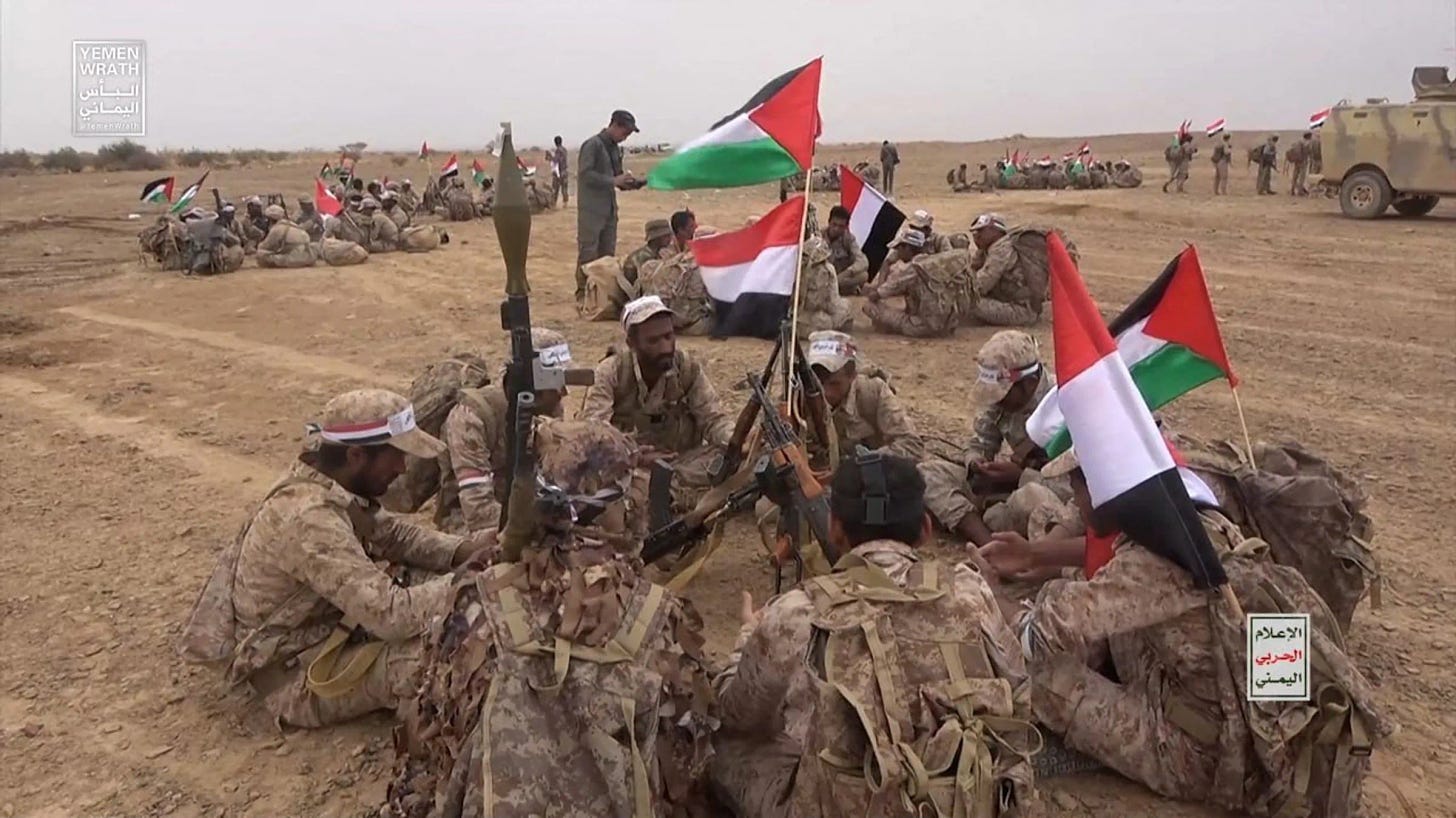Playing Twister with the Houthis
The U.S., after initially downplaying the Houthi threat, is now in the ring, trading blows with them.
credit: Houthi Media Center
We are seeing some pretty scary moves between the US and Iran, with Iran moving a warship to the Red Sea amid rising tensions in the wake of the Israel-Hamas war.
The latest flashpoint stems from tensions between the U.S. and Iranian-backed Houthi rebels. The Houthis are targeting Israeli-based ships or boats headed to Israel to support their Hamas brothers. And, so, the US just sank three Houthi boats.
If you're scratching your head over America’s entanglement with these Houthi rebels, join the club. We're witnessing the U.S. knot itself in a web of contradictions over the group that is so dense, it could give Charlotte's Web a run for its money.
Let’s set the scene: In 2014, Yemen, the Arab world’s poorest nation, became embroiled in a brutal conflict, with Saudi Arabia battling the Iran-backed Houthi forces. The Houthis took over the capital city Sanaa, which was followed by a rapid Houthi takeover of the government, forcing Yemen’s President Abd-Rabbu Mansour Hadi to flee into exile. A Saudi-led coalition intervened militarily to restore Hadi’s government and put a lid on Iran’s growing influence in the region.
The U.S., under various administrations, has swung wildly in its approach. Initially, Washington endorsed and logistically supported the Saudi-led campaign against the Houthis, then pivoted, criticizing the Saudis for what the U.S. government deemed was an indiscriminate campaign causing too much humanitarian suffering.
(Just as an aside: the scorched earth tactics used by the Saudis are eerily similar to Israel's approach in fighting Hamas. So, the U.S. condemned one ally for a military campaign to defend its territory against a terrorist group while supporting another ally doing pretty much the same. But, let's park that thought for now.)
Back to Yemen. When the Houthis launched missiles and drones at the United Arab Emirates, causing a fire near the airport of Abu Dhabi, and carried out a drone attack that temporarily shut down a major Saudi oil pipeline, the U.S. response was tepid at best. Washington decided the Houthis weren't terrorist-y enough to worry about and, in a bid to coax them to the negotiating table, took the group off the U.S. list of officially designated terrorist organizations. It was akin to saying, 'Sure, that guy has a chainsaw and a hockey mask, but until he actually chases someone, let's give him the benefit of the doubt.'
A ceasefire that expired last October has largely held, and in recent months, negotiations between Saudi Arabia and the Houthis have yielded positive results to support Yemeni political reconciliation and end the decades-long war. Meanwhile, the United Nations considers the humanitarian disaster in Yemen among the worst in the world.
Fast forward to October 7. When the Houthis targeted Israel, the U.S. sprang into action and is now hitting back at the group for disrupting Red Sea shipping lanes, supporting Hamas, and hitting U.S. forces. Yes, the same group they previously removed from the terrorism list has morphed into a significant threat.
And if that weren’t enough irony: Saudi Arabia, previously on the receiving end of Houthi missiles, is now playing defense for Israel, shooting down missiles aimed at the very country it's been publicly criticizing over Gaza while negotiating a peace deal with Israel. It’s not just irony, it’s irony with a side of fries.
So, to sum it up: The U.S., after initially downplaying the Houthi threat, is now in the ring, trading blows with them. And Saudi Arabia, once the Houthis' punching bag, is now shielding Israel from the same fists. Everyone is essentially fighting a proxy war against Iran, the Houthis' backer, while the U.S. tries for a nuclear deal with Tehran and Riyadh tries to keep its fragile truce with Iran. It's a geopolitical Twister game, with everyone contorting to keep up with the ever-shifting rules of engagement.
In the shifting sands of Middle Eastern politics, the enemy of my enemy can sometimes be my friend – but only when convenient. Today's crisis can be tomorrow's footnote, depending on who's involved and what's at stake. The rules are rewritten on the fly, players switch sides, and the consistent losers in this game are, tragically, the innocent civilians caught in the crossfire.




